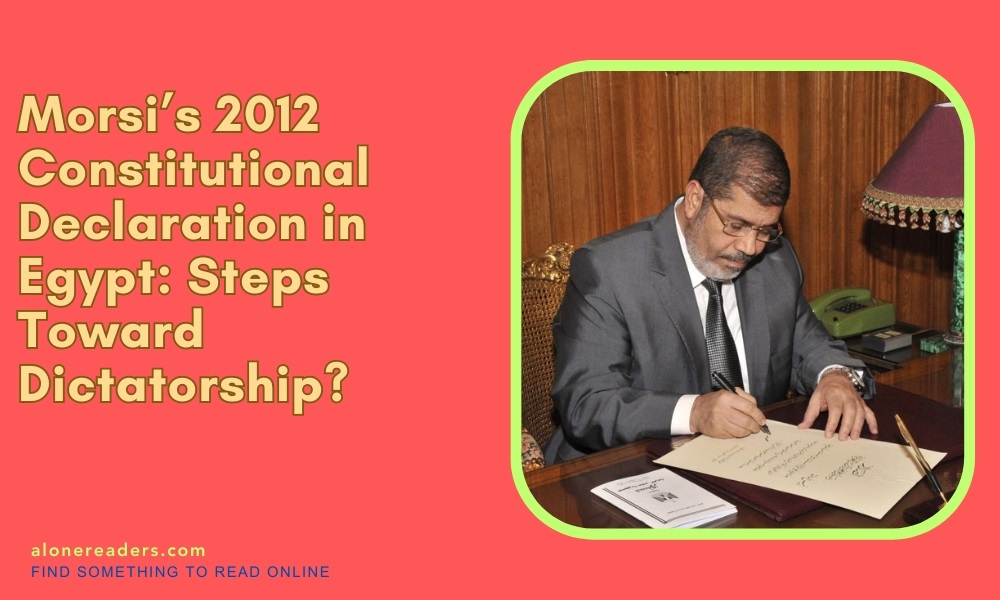
On November 22, 2012, President Mohamed Morsi of Egypt issued a constitutional declaration that would profoundly impact the political landscape of the country, sparking widespread controversy and debates about the potential rise of a new dictatorship. This move came in the wake of Egypt's 2011 revolution, which had toppled the long-standing regime of Hosni Mubarak, setting the stage for what many hoped would be a new era of democratic governance.
Morsi, who was elected with a narrow margin in June 2012, was Egypt's first democratically elected president and a leading figure in the Freedom and Justice Party, which had affiliations with the Muslim Brotherhood. His presidency was seen as a test case for the integration of Islamist movements into the Egyptian political mainstream after decades of political exclusion under previous authoritarian regimes.
The declaration Morsi issued made several sweeping changes that consolidated his power significantly. Most controversially, it stated that all decisions made by the president were immune from judicial oversight until a new constitution and a new parliament were put into place. Essentially, this meant that Morsi’s decisions could not be challenged or overturned by any court, rendering his authority virtually absolute.
Furthermore, the declaration required a retrial of officials from the Mubarak era who had been accused of killing or injuring protesters, responding to a public outcry over the perceived leniency of their initial trials. It also protected the Islamist-dominated constituent assembly, which was tasked with drafting a new constitution, from judicial dissolution. Critics argued that this shielded one of the most crucial processes in post-revolution Egypt from any form of accountability and opened the door to a constitution that could heavily favor Morsi and his supporters.
The backlash to the declaration was immediate and intense. Opponents viewed Morsi's move as an overt attempt to monopolize power and place himself above the law, fearing a return to a dictatorial regime reminiscent of Mubarak's. Massive protests erupted across Egypt, particularly in Tahrir Square—the epicenter of the 2011 revolution—highlighting the deep divisions within the country between the president’s Islamist supporters and the secular, liberal, and leftist opposition.
These demonstrations were not just limited to liberal and secular groups; they also included some who were initially supportive of Morsi but who felt betrayed by his grab for unchecked power. The situation was further complicated by the support Morsi received from major Islamist groups, who saw the declaration as a necessary step to protect the gains of the revolution and ensure stability.
The international reaction was one of concern, with key allies and observers warning that such moves could undermine the democratic process in Egypt. The United States, European Union, and other international bodies expressed their apprehension about the potential for increased authoritarianism and the volatile situation's impact on the already fragile Middle Eastern region.
The crisis reached its peak when violence erupted between supporters and opponents of Morsi, resulting in deaths and injuries, further polarizing the nation. Amidst this turmoil, Morsi attempted to clarify his position, claiming that the powers were temporary and meant to expedite the transition to a stable government. However, the distrust was deep-seated, and these assurances did little to quell the unrest.
Ultimately, the pressure led Morsi to annul the declaration on December 8, 2012, but the damage to his presidency and the political environment in Egypt was already significant. The episode left a lasting impact on the credibility of Morsi’s administration, casting long shadows over his intentions and his commitment to democratic principles.
The constitutional declaration of 2012 stands as a critical moment in Egypt’s turbulent transition. It highlighted the challenges faced in moving from a dictatorial past to a democratic future, exposing the fragility of new political systems and the dangers inherent in the concentration of power. For many, it was a stark reminder of the enduring struggle for democracy in regions marked by long histories of authoritarian rule, demonstrating how quickly the hopes of a revolution can be threatened by the resurgence of old patterns of governance.